Five powerful word games for aphasia recovery include Apples to Apples for semantic connections, Pictionary for non-verbal communication, Charades for articulation skills, digital apps like Lingraphica SmallTalk for daily practice, and group word activities that combat isolation. These games don’t just improve language—they build confidence, reduce stress, and promote neuroplasticity in language-processing regions. The engaging nature of these activities transforms rehabilitation from tedious exercises into enjoyable social experiences you’ll actually look forward to.
Engaging Word Games That Boost Communication Skills
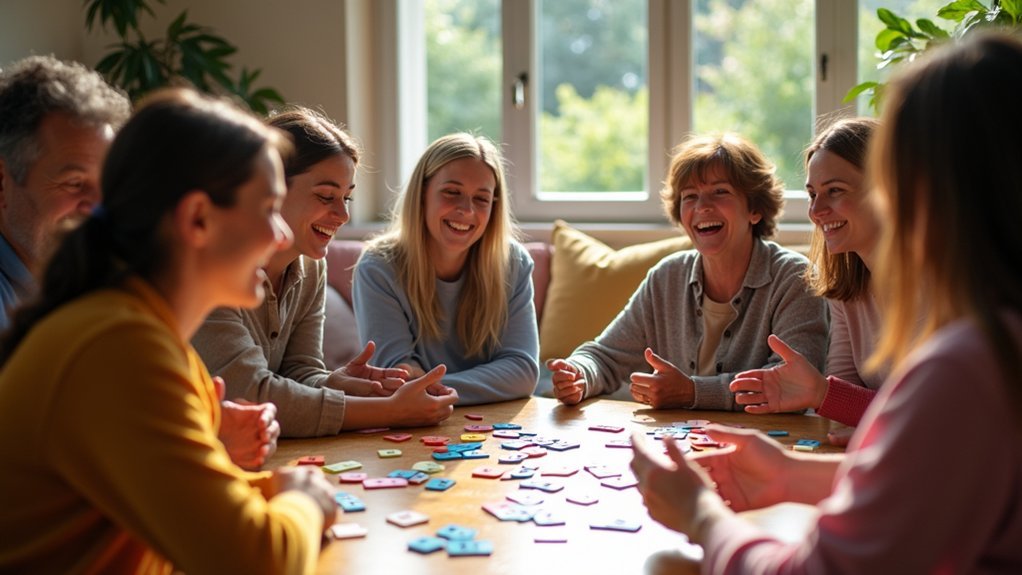
The transformative power of game-based interventions has revolutionized aphasia recovery, offering patients enjoyable pathways to rebuild communication abilities.
Gamified naming activities using visual aids greatly enhance word retrieval, while team-based word games promote collaboration and language production.
You’ll find games inspired by charades particularly effective for expressive aphasia, as they combine non-verbal communication with verbal cues. These activities incorporate phonemic, semantic, and gesture cueing to facilitate word recall. The GAIN-PT approach demonstrates that scenario games simulating everyday interactions significantly enhance functional communication skills.
Studies show these approaches yield a 59% treatment response rate and meaningful improvements in naming tasks.
What makes these games especially valuable is their ability to generalize skills to untreated words and tasks. Even patients with moderate-severe aphasia show robust improvements, making these cost-effective interventions comparable to individual therapy while maintaining higher engagement levels.
How Group Word Games Foster Social Recovery
While individual therapy focuses primarily on language restoration, group word games create unique environments where social recovery flourishes alongside linguistic improvement. You’ll find that these settings naturally encourage more communication initiation through varied modalities—vocalizations, facial expressions, and gestures—often with the purpose of building social connections.
Group games provide more than just language practice; they offer a sense of community that directly combats the isolation commonly experienced with aphasia. When you participate in structured word games, you’re developing language skills while simultaneously rebuilding social confidence. Research shows participants communicate more in these settings than in individual therapy. Many patients report a clear preference for games over traditional therapy sessions due to their engaging and socially supportive nature.
Whether online or in-person, these game environments create safe spaces where patience, understanding, and shared experiences foster emotional well-being beyond linguistic gains.
Digital Apps and Tools for Daily Word Practice
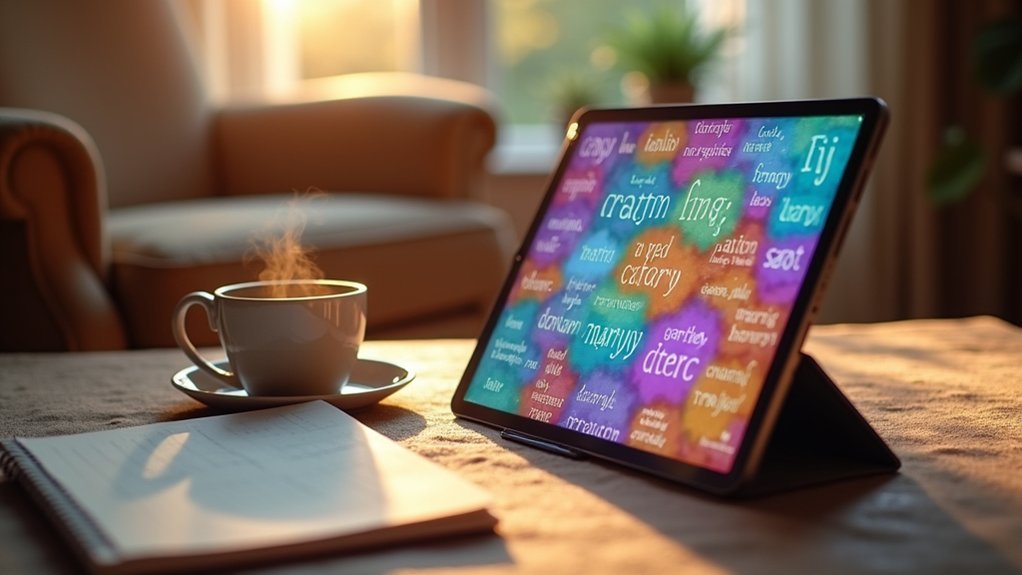
Digital technology has revolutionized aphasia therapy by providing accessible tools for consistent practice between formal sessions.
You’ll find specialized apps like Lingraphica SmallTalk that use graphic icons and videos to assist with everyday communication, while TalkPath Therapy offers extensive web-based exercises for language and cognitive skills.
For structured practice, try Language Therapy 4-in-1, which combines speaking, listening, reading, and writing exercises available on both iOS and Android.
When you need communication assistance, Proloquo2Go ACC offers customizable options with type-and-speak features.
Don’t overlook interactive word games that make recovery engaging.
Games like 7 Little Words, Heads Up, and digital crossword puzzles can improve your vocabulary and comprehension while providing enjoyable practice. These games also encourage interaction with others, creating a social environment that enhances the therapeutic experience.
Many apps offer free trials, allowing you to find the right fit for your recovery journey.
Classic Word Games Adapted for Aphasia Therapy
Classic word games offer powerful rehabilitation tools when adapted for aphasia therapy. You’ll find familiar games reimagined to target specific language skills impaired by aphasia.
| Game | Therapeutic Focus |
|---|---|
| Apples to Apples | Word retrieval, semantic connections |
| Pictionary | Expressive language, non-verbal communication |
| Monopoly | Turn-taking, conversational practice |
| Bananagrams | Letter recognition, word formation |
| Charades | Articulation, phonological awareness |
Word-finding games like Anomia and Scattergories strengthen your ability to access vocabulary, while Taboo helps you develop circumlocution skills when specific words are challenging. Semantic Feature Analysis activities can significantly benefit those struggling with word-finding difficulties by systematically describing features of target objects. Jenga can be modified to incorporate language tasks with each block pulled. Even simple games like Tic-Tac-Toe transform into powerful therapy tools when you’re required to correctly articulate target sounds before marking the grid.
The Science Behind Word Games and Brain Recovery
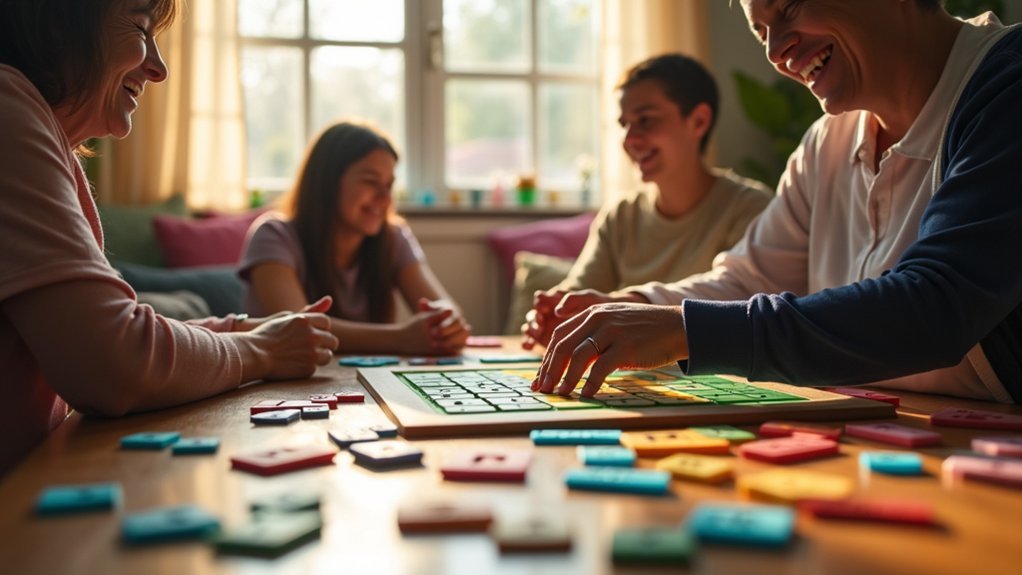
The science behind word games and their impact on brain recovery offers fascinating insights into neuroplasticity. When you engage in word puzzles regularly, you’re actively promoting your brain’s ability to reorganize and adapt—a critical mechanism for aphasia recovery.
Word games strengthen synaptic connections and build neural pathways, particularly in language-processing regions. You’ll benefit most from consistent engagement rather than lengthy, occasional sessions. Research shows these activities enhance memory, cognitive flexibility, and problem-solving abilities. As experts emphasize, challenging your brain is more important than the specific duration of play.
Traditional crosswords may offer advantages over digital alternatives, potentially reducing brain shrinkage over time. While combining word games with exercise and proper nutrition maximizes cognitive benefits, it’s worth noting that research on preventing dementia remains inconclusive.
Still, the stress reduction and improved focus from enjoyable word puzzles support overall brain health during recovery.
Frequently Asked Questions
How Soon After Stroke Can Patients Begin Word Game Therapy?
You can start word game therapy as early as two weeks post-stroke when you’re medically stable. You’ll benefit most during the first six months, especially with intensive sessions of 8-10 hours weekly.
Can Word Games Help With Severe Aphasia and Apraxia?
Yes, you’ll find word games helpful for severe aphasia by improving your word retrieval in an engaging way. For apraxia, they’re best used as complementary therapy alongside specific motor speech interventions for thorough recovery.
Are Insurance Companies Covering Game-Based Aphasia Therapy?
Insurance coverage for game-based aphasia therapy varies widely by plan. You’ll need a medical necessity justification and provider referral. Check with your insurance company and be prepared to appeal if denied initially.
How Do Family Members Avoid Frustrating Patients During Home Practice?
You’ll avoid frustrating your loved one by setting achievable goals, maintaining a calm environment, using visual aids, and taking regular breaks. Don’t speak loudly, but do celebrate small successes during practice sessions.
Should Bilingual Patients Practice Word Games in Both Languages?
Yes, you should practice word games in both languages. Research shows dual-language practice strengthens your lexical-semantic networks and often creates transfer effects, where improvement in one language benefits the other.
In Summary
You’ve now got five powerful word games to support your aphasia recovery journey. Whether you’re playing in groups, using digital tools, or adapting classic favorites, these activities strengthen your brain’s language pathways. Remember, consistent practice is key. Even 15 minutes daily can make a difference. As you engage with these games, you’re not just having fun—you’re actively rebuilding your communication skills and reclaiming your voice.

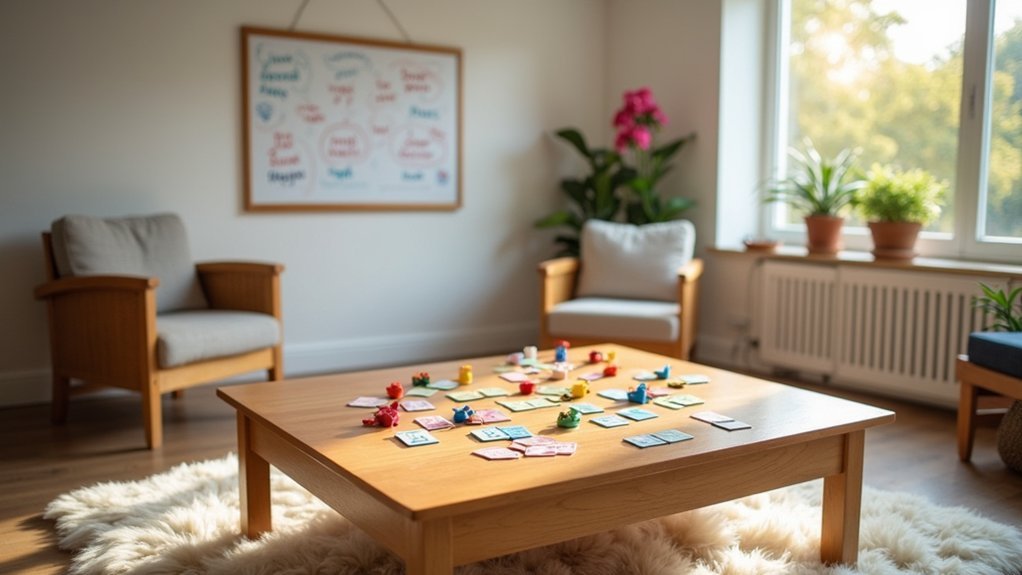
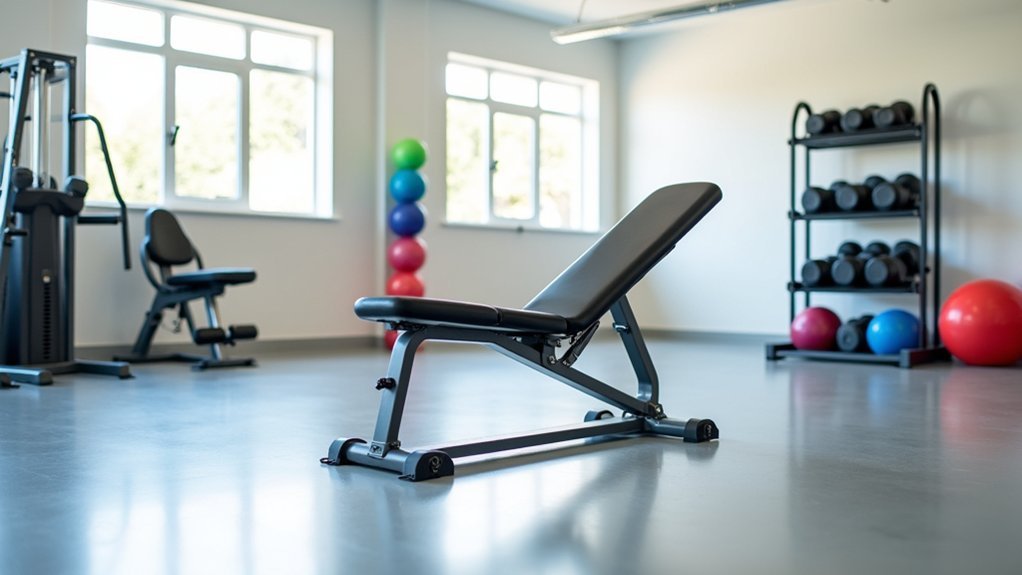
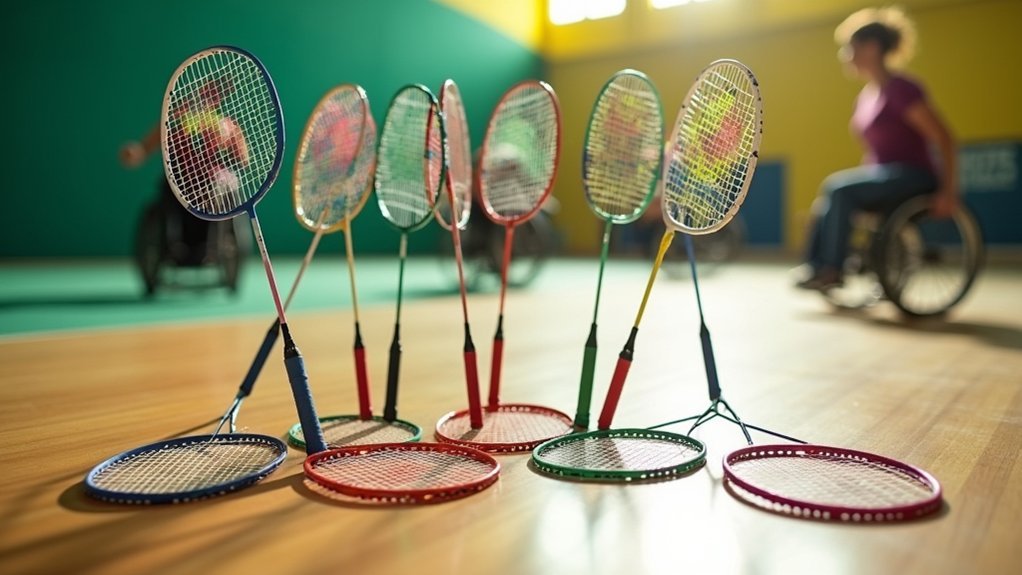
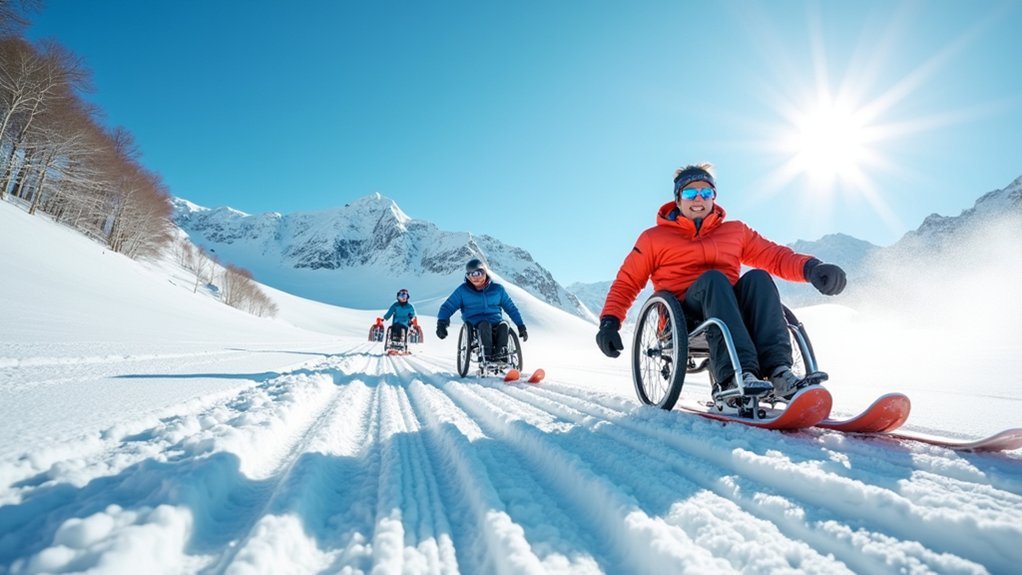
Leave a Reply